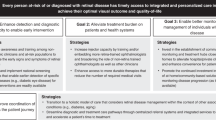Abstract
Initiated almost four decades ago in the form of an 11-bed clinic in Madurai, Aravind Eye Care System with its large network of hospitals, vision centres and community outreach programs is now recognized in India and beyond as a major actor of health care. This paper upholds the view that Aravind’s innovative characteristics call for the creation of a specific category: transformational entrepreneurship. It first clarifies what may be called the ‘Aravind paradox’: Aravind achieves compassion through Taylorism, providing free eye care to poor patients while expanding its robust entrepreneurial model. It then analyses the social, cultural and policy implications of Aravind’s success, notably from the perspective of its contribution to the common good. Finally, the paper identifies the definitional components of transformational entrepreneurship.
Similar content being viewed by others
References
Alexander, J.M., and J. Buckingham. 2011. Common good leadership in business management: an ethical model from the Indian tradition. Business Ethics: A European Review 20(4): 317–327.
Aravind Eye Care System 2013. Activity Report 2012–2013. Madurai (India): AECS. Retrieved from http://www.aravind.org/downloads/AECS_Annual_Report_2012_13.pdf.
Aravind Eye Care System 2014. Activity Report 2013–2014. Madurai (India): AECS. Retrieved from http://www.aravind.org/downloads/AECSReport201314.pdf.
Danak, D. 2010. The divine side of enterprise. Journal of Human Values 16(1): 71–86.
De Bettignies, H.-C., and F. Lépineux. 2009. Business and the global common good: an interdisciplinary approach. In Business, globalization and the common good, ed. H.-C. De Bettignies and F. Lépineux, 27–61. Oxford: Peter Lang.
Dhammika, S. 1993. King Ashoka: his edicts and his times. Kandy: Buddhist Publication Society.
Gangolli, L.V., R. Duggal, and A. Shukla. 2005. Review of healthcare in India. Mumbai: Centre for Enquiry into Health and Allied Themes.
Kale, S.H. 2004. Spirituality, religion, globalization. Journal of Macromarketing 24(2): 92–107.
Lépineux, F., and J.-J. Rosé. 2010. Spiritual leadership in business: perspectives from Christianity and Hinduism. European SPES Cahiers 4: 27–41.
Mehta, P.K., and S. Shenoy. 2011. Infinite vision. How Aravind became the world’s greatest business case for compassion. San Francisco: Berrett-Koehler.
Mulligan, S. 2010. Capabilities and the common good. Irish Theological Quarterly 75(4): 388–406.
Nussbaum, M.C. 2011. Creating capabilities. The human development approach. Cambridge: Harvard University Press.
O’Brien, T. 2009. Reconsidering the common good in a business context. Journal of Business Ethics 85(1): 25–37.
Radhakrishnan, S. 1927. The Hindu view of life. London: Allen & Unwin.
Rangan, K.V. 2009. The Aravind eye hospital, Madurai, India: in service for sight. HBS Case 9–593–098. Cambridge: Harvard Business School.
Rawls, J. 1971. A theory of justice. Cambridge: Belknap.
Rosenberg, T. 2013. A hospital network with a vision. The New York Times, 16 January. Retrieved from http://opinionator.blogs.nytimes.com/2013/01/16/in-india-leading-a-hospital-franchise-with-vision/?_r=0.
Sen, A. 1999. Development as freedom. Oxford: Oxford University Press.
Sen, A. 2009. The idea of justice. London: Allen Lane.
Shah, J., and L.S. Murty. 2005. Compassionate, high quality healthcare at low cost: the Aravind model. IIMB Management Review 16(3): 31–43.
Sri Aurobindo (1953). The life divine. New York: The Sri Aurobindo Library.
Srinivasan, M.S. 2003. The meeting of business and spirituality: its evolutionary significance. Journal of Human Values 9(1): 65–73.
Tabary, Z. 2013. Frugal innovation in healthcare. Delivering high-quality eye care at minimal cost. The Economist Intelligence Unit, August 8th. Retrieved from http://www.economistinsights.com/healthcare/opinion/frugal-innovation-healthcare.
Thaker, K.B. 2009. Approaches to implement spirituality in business. Journal of Human Values 15(2): 185–198.
Virmani, A., and F. Lépineux. 2015. Spiritual-based entrepreneurship for an alternative food culture: the transformational power of Navdanya. In The spiritual dimension in business ethics and sustainability management, ed. L. Zsolnai. London: Springer: 125–142.
Author information
Authors and Affiliations
Corresponding author
Rights and permissions
About this article
Cite this article
Virmani, A., Lépineux, F. Aravind Eye Care System as Transformational Entrepreneurship: Spiritual Roots, Multi-Dimensional Impact. Philosophy of Management 15, 83–94 (2016). https://doi.org/10.1007/s40926-016-0032-z
Published:
Issue Date:
DOI: https://doi.org/10.1007/s40926-016-0032-z




